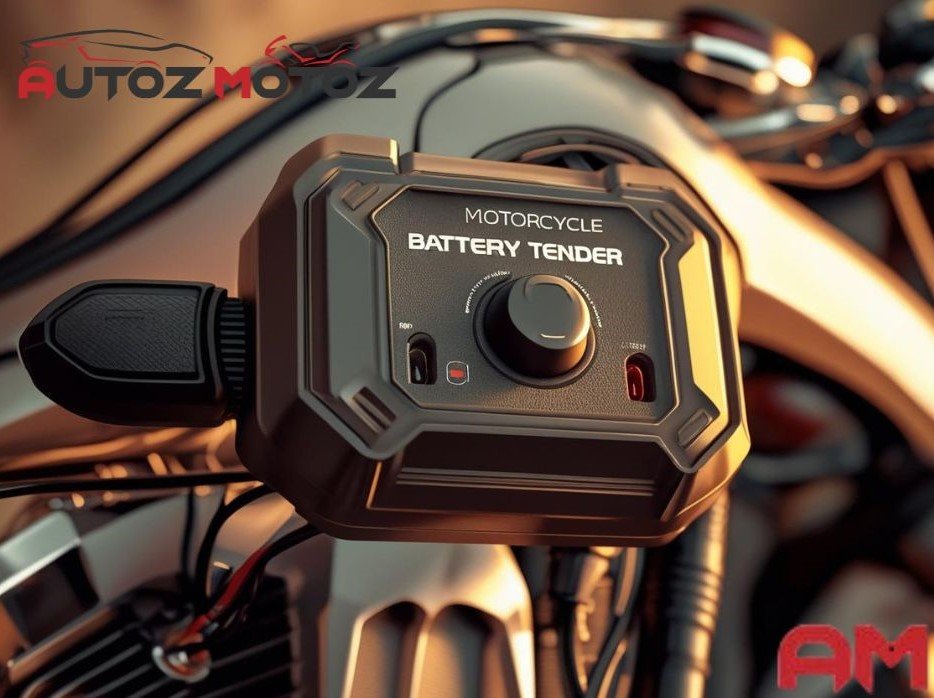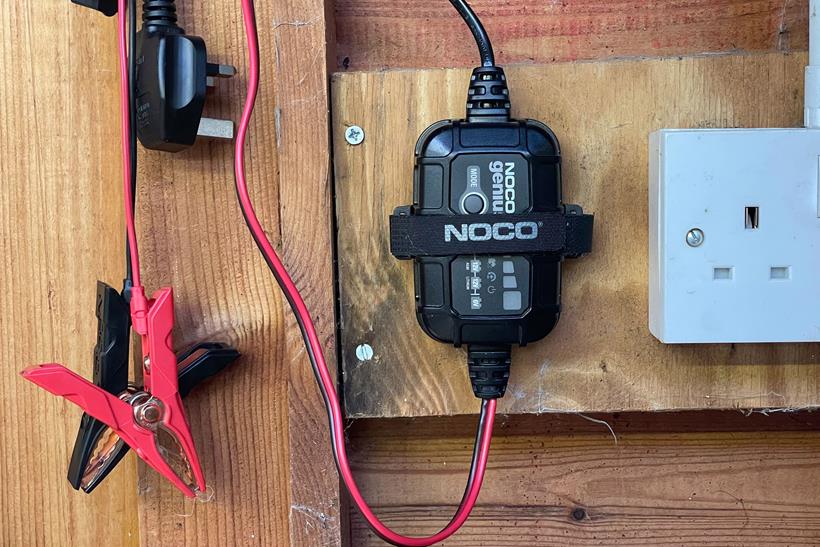Motorcycles require reliable batteries to start smoothly and perform well. However, motorcycle batteries naturally lose charge over time, especially when the bike is not in use. This can cause issues such as difficulty starting or even complete battery failure.
Enter the motorcycle battery tender—a specialized charger designed to maintain battery health by providing a controlled, consistent charge. Unlike regular chargers, battery tenders automatically adjust the current to avoid overcharging, which can damage the battery. They are especially useful during off-season storage, extended periods of inactivity, or in climates with extreme temperatures. For motorcyclists who value convenience, reliability, and the longevity of their battery investment, battery tenders offer an essential solution.
Discussion
They help prevent sulfation—a common cause of battery failure where lead sulfate crystals build up, reducing capacity—and ensure your motorcycle is always ready to ride. Battery tenders come in various forms, including basic trickle chargers, smart chargers with microprocessor controls, and advanced models with multi-stage charging and diagnostic capabilities.
Choosing the right one depends on your battery type, usage patterns, and environment. This article explores why motorcycle battery tenders are important, their benefits, safety considerations, market trends worldwide, and recommendations to help you pick the best tender for your needs. Whether you ride daily or store your bike during winter, understanding battery tenders will keep your motorcycle’s electrical system healthy, save you money on replacements, and reduce frustration caused by dead batteries.
Why Motorcycle Battery Tenders Matter
Batteries in motorcycles lose charge even when the bike is not running—a process called self-discharge. Over time, if the battery voltage drops too low, irreversible damage like sulfation occurs, which decreases battery life and performance. Simply leaving your bike unused without maintenance can ruin a perfectly good battery. A motorcycle battery tender solves this problem by delivering a low, regulated current to maintain the battery at full charge without overcharging it. This “smart charging” ensures the battery stays ready to use, especially during periods of inactivity such as winter storage or long trips.
Additionally, tenders often include safety features such as reverse polarity protection and temperature compensation. Using a tender can extend battery life by years and prevent the inconvenience and cost of replacing batteries prematurely. It also improves reliability — your bike starts easily every time, saving you from being stranded with a dead battery.
Battery tenders are particularly vital for riders who don’t use their motorcycles daily or who have multiple bikes stored simultaneously. By maintaining a full charge, tenders reduce the chance of corrosion inside the battery, maintain electrolyte balance, and improve overall battery health. Investing in a quality battery tender is a small cost that pays off through greater peace of mind and fewer mechanical headaches. In summary, motorcycle battery tenders protect your investment, save time and money, and keep your bike ready to ride.
Pros and Cons of Battery Tenders
Battery longevity: Prevent sulfation and extend battery life by maintaining optimal charge.
Convenience: Easy to connect and leave attached for long periods without damage.
Smart operation: Automatic charging and maintenance modes prevent overcharging and overheating.
Cost savings: Reduce the frequency of costly battery replacements.
Versatility: Compatible with different battery types and vehicles.
Improved reliability: Ensure the bike starts every time, especially after long storage.
Safety: Advanced chargers include protections like reverse polarity, short-circuit, and temperature compensation.
Initial investment: Quality tenders can be expensive compared to basic chargers.
Dependency on power source: Require electricity, limiting use in remote locations without access.
Variable quality: Low-cost or uncertified models may lack safety features or durability.
Limited outdoor use: Many tenders aren’t fully waterproof or weatherproof unless specified.
Potential misuse: Incorrect use can damage batteries or cause hazards.
Necessity of Battery Tenders in Different Riding Conditions

In contrast, hot and humid regions such as Southeast Asia or Australia expose batteries to accelerated corrosion and water ingress, so tenders with waterproof designs are preferred. Riders in urban areas who use their motorcycles daily may not need a battery tender, but those who use bikes seasonally or only on weekends find tenders invaluable. Motorcycle owners with multiple bikes also benefit by using tenders to maintain all batteries simultaneously, avoiding frequent battery replacements.
For adventure riders or those with off-road bikes, rugged and weather-resistant battery tenders provide durability in harsh conditions. Additionally, the rise of lithium-ion batteries demands tenders that can safely charge various chemistries, increasing the necessity for versatile chargers. Whether you’re storing your motorcycle over winter, using it intermittently, or living in extreme weather, a battery tender ensures the battery stays healthy and functional. Without one, the battery risks sulfation, corrosion, and early failure, leading to costly replacements and inconvenience.
The necessity of battery tenders varies depending on where and how you ride. In colder climates like northern US, Canada, or Europe, batteries discharge faster due to reduced chemical reactions at low temperatures. This makes battery tenders essential to prevent deep discharge and freezing damage during winter storage.
Safety Considerations and Risks
While battery tenders offer great benefits, improper use can lead to safety risks. One of the main concerns is overcharging;
⇒ If a charger lacks automatic cut-off or maintenance mode, it can cause the battery to overheat, boil electrolyte, or even explode. Another risk is reverse polarity.
⇒ Connecting the charger clamps to the wrong battery terminals can cause sparks, damage, or fire. Poorly designed or cheap battery tenders often lack essential safety features such as short-circuit protection, thermal regulation, and spark prevention, increasing the risk of accidents. It is also unsafe to charge batteries in unventilated indoor spaces because hydrogen gas emitted during charging is explosive.
To mitigate risks, always use battery tenders certified by recognized safety standards, read the user manual thoroughly, and double-check connections before plugging in. Proper battery tender use enhances safety and battery longevity, while neglect or misuse can cause dangerous situations.
Inspiring Feature and Technlogy may Lead the Decade
In a world increasingly defined by smart, connected, and energy-efficient solutions, one often-overlooked yet transformative innovation is the motorcycle battery tender. As motorcycles continue to gain popularity for commuting, adventure, and eco-conscious transportation, maintaining battery health has become more crucial than ever. The modern battery tender is more than just a charger — it’s a smart guardian of power, ready to lead a quiet revolution in vehicle care throughout the coming decade.
What makes today’s motorcycle battery tenders truly inspiring is their intelligent charging technology. This not only extends battery life but also ensures the bike is always ready to ride — a feature that aligns perfectly with our fast-paced, on-demand lifestyles.
Many battery tenders now come with smart connectivity, allowing riders to monitor battery status via smartphone apps, receive low-voltage alerts, and even control charging remotely. These smart features make battery maintenance seamless and proactive, reducing the risk of sudden breakdowns or dead batteries.
Furthermore, innovations like solar-powered battery tenders reflect a growing shift toward sustainable energy use. With clean, off-grid power, riders can maintain their batteries in an eco-friendly way, especially during long-term storage or remote trips.
As electric motorcycles gain momentum, battery health will be at the core of vehicle performance and safety. In this context, the motorcycle battery tender evolves from a maintenance tool to an essential piece of future-ready infrastructure — one that supports both traditional and electric two-wheelers.With its blend of smart features, sustainability, and reliability, the motorcycle battery tender is a small but powerful technology poised to lead the decade in personal mobility innovation.
By Inspired You may Look the Trendy Product From Amazon
Why Buy the NEXPEAK- Charger Maintainer for Motorcycle :
- Smart Multi-Stage Charging
- Automatic Temperature Adjustment
- Full Safety Protection Features
- Real-Time LCD Display
- Motorcycle Maintenance Mode
- Auto Float Mode Activation
- Battery Repair Function
- Easy Plug-and-Play Use
- Compact & Portable Design
- Great Value for the Price
Why Buy the Battery Tender 12V, 750mA (Charger and Maintainer):
- 12V battery maintainer
- 750mA safe charging rate
- Auto float mode
- Smart microprocessor
- Reverse polarity protection
- Plug-and-play setup
- Great for motorcycles
- Quick-connect cables
- Ideal for long-term storage
- Trusted, reliable brand
Why Buy the NOCO GENIUS1: 1A 6V/12V Smart Battery Charger:
- 6V/12V charging
- 1A smart output
- Auto voltage detect
- Float & trickle mode
- Battery repair mode
- Safety protected
- Multi-vehicle use
- Temp compensation
- Compact size
- Plug & play
See More for Exploring
Why Buy the Foval Automatic Trickle Battery Charger
- 12V lead-acid compatible
- 1A trickle charging
- Auto float mode
- 4-stage smart charge
- Full safety protection
- LED status lights
- Includes clamps & rings
- For bikes, cars, ATVs
- Compact & portable
- Great value, easy to use
See More for Exploring
Why Buy the Battery Tender Plus 12V 1.25 AMP:
- 12V lead-acid compatible
- 1.25A fast charging
- Auto float mode
- 4-stage smart charge
- Temp-compensated charging
- Reverse polarity safe
- LED charge indicator
- Quick-disconnect harness
- Alligator & ring terminals included
See More for Exploring
6V/12V Smart Battery Charger Maintainer:
- 6V & 12V compatible
- Smart charging
- Auto float mode
- Auto voltage detect
- Temp control
- Full safety
- LED/LCD display
- Plug & play
- Multi-vehicle use
- Compact size
Why Buy the NOCO GENIUS2 (2A 6V/12V Smart Charger):
- 6V & 12V
- 2A output
- Auto detect
- Float mode
- Dead battery mode
- Battery repair
- Temp control
- Full protection
- Global use Compact & durable
Market Analysis : Recommended
Credit by: www.motorcyclenews.com
What to consider when buying a motorcycle battery charger
First and foremost, you will want to consider a charger’s compatibility with the various battery technologies. Different types of battery need to be charged in different ways, and while many battery chargers on the market today are compatible with lead acid, gel, and lithium-ion batteries (including all the ones featured in this guide), that’s not always the case. Check what type your battery is, and make sure you get a charger that’s appropriate.
Relevant Motorcycle Product ref by AutozMotoz Reference by : www.motorcyclenews.com
Fitting the Motorcycle Battery Tender
Setting up a battery tender:
Avoid charging frozen or leaking batteries. For lithium batteries, always use chargers compatible with that chemistry. Regular use during storage ensures battery longevity and trouble-free starts.
- Identify battery specs: Know your battery voltage (usually 12V) and type (lead-acid, AGM, gel, lithium).
- Prepare the bike: Turn off the motorcycle, ensure the battery terminals are clean and dry.
- Power the charger: Plug the charger into a standard AC outlet.
- Monitor indicators: Most chargers have LED indicators — red means charging, green means fully charged and in maintenance mode.
- Leave connected: Smart tenders can stay connected indefinitely without overcharging.
Battery Tender Maintenance and Best Practices
| SL | Consideration | Best Practices |
|---|---|---|
| 1 | Inspect regularly | Check cables and clamps for corrosion, fraying, or loose connections; replace damaged parts promptly. |
| 2 | Clean terminals | Use a wire brush and baking soda solution to clean battery terminals before charging. |
| 3 | Preserve | Keep dry and clean. |
| 4 | Avoid enclosed spaces | Charge batteries in well-ventilated areas to prevent hydrogen gas buildup, which is explosive. |
| 5 | Use correct settings | Match the charger mode to your battery type—AGM, gel, lithium, etc. |
| 6 | Monitor battery health | Occasionally test your battery voltage and capacity with a multimeter or battery tester. |
| 7 | Disconnect if issues arise | If the charger or battery heats excessively or shows signs of damage, stop charging immediately. |
| 8 | Follow manufacturer instructions | Every tender model has specific guidelines; adherence ensures safety and longevity. |
| 9 | Enhance the capacity | Upgrade to a higher amperage smart tender. |
Country-Wise Revolution and Market Trends

The use of motorcycle battery tenders reflects geographic, climatic, and cultural factors worldwide. In colder regions such as Canada, the northern United States, and Scandinavia, battery tenders have become essential for winter storage, driving a steady demand for advanced, cold-weather capable chargers.Europe’s increasing motorcycle touring culture also fuels interest in reliable battery maintenance solutions.
In contrast, countries with large motorcycle populations like India, Indonesia, and Vietnam are experiencing a surge in affordable, entry-level tenders due to growing awareness of battery care amid tropical weather challenges.
Meanwhile, Australia’s off-road and adventure biking culture prefers rugged, weatherproof chargers designed for harsh environments. The global rise in lithium-ion motorcycle batteries prompts charger manufacturers to innovate versatile products compatible with multiple chemistries.
E-commerce platforms like Amazon have accelerated battery tender sales by providing easy access and user reviews worldwide. Environmental concerns and the push for sustainability are also influencing product features, such as energy-efficient smart chargers with low standby power consumption. As motorcycle ownership expands globally, the market for battery tenders is evolving rapidly, blending affordability, technology, and durability to meet diverse rider needs.
Conclusion
A motorcycle battery tender is an indispensable tool for any rider who values battery longevity, reliability, and convenience. By intelligently maintaining the charge, tenders prevent sulfation, protect battery health, and ensure your bike starts easily every time. Especially in cold or off-season conditions, tenders save money by reducing premature battery replacements. Safety is paramount-always use certified products, connect properly, and follow manufacturer guidance to avoid hazards.
The market offers a wide range of battery tenders tailored to various battery chemistries and rider needs. Investing in a quality tender and maintaining it correctly guarantees your motorcycle’s electrical system stays healthy and your rides remain hassle-free. Whether you are a casual rider, daily commuter, or adventure enthusiast, a battery tender is a smart, cost-effective accessory to add to your motorcycle toolkit.
- Investing in the best motorcycle battery tender means smarter spending—protect your battery investment and avoid costly replacements with reliable, efficient charging technology.
- Choosing a quality battery tender is a small upfront cost that delivers big savings by extending your motorcycle battery’s lifespan and reducing maintenance expenses.
- Spend wisely on a top-rated motorcycle battery tender to safeguard your battery’s health, ensuring your money goes further and your bike stays ready to ride.
- Don’t let a dead battery drain your budget—invest in the best battery tender to maximize performance and minimize costly downtime.
Frequently Asked Questions (FAQs)
A battery tender maintains optimal charge levels automatically, preventing damage from overcharging or deep discharge—something regular chargers can’t do.
Yes—steady maintenance prevents wear and sulfation.
Definitely. Smart tenders switch to float mode automatically.
Auto shut-off, battery type support, and safety protections.
Only if it’s not too far gone—some models have recovery mode.
Yes, with multi-bank or quick-connect options.
Top models do—check for low-temp rated designs.
Technical precision in motorcycles, cars, and automotive gear is established by Nahid Hassan through rigorous evaluation. Performance-driven reviews and high-value affiliate insights are consistently curated at AutoZMotoZ to ensure reader trust. Absolute integrity is maintained in every analysis, with a focus on original and human-verified data.




















